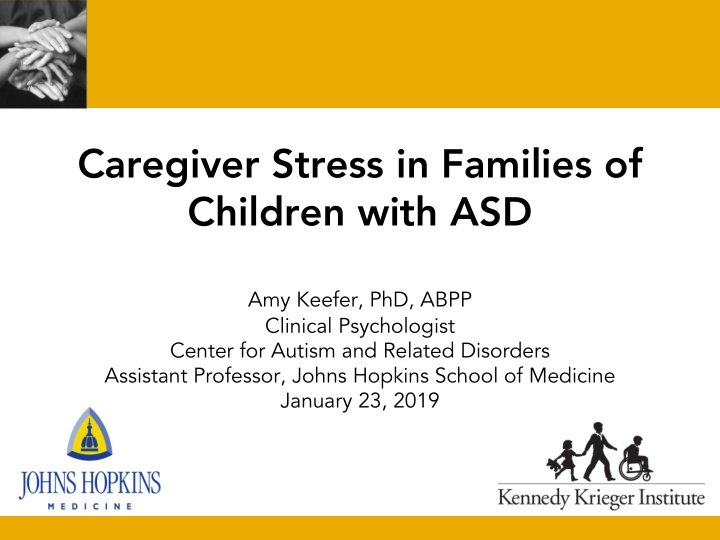



Click to edit Master title style Caregiver Stress in Families of Children with ASD Amy Keefer, PhD, ABPP Clinical Psychologist Center for Autism and Related Disorders Assistant Professor, Johns Hopkins School of Medicine January 23, 2019
No Disclosures Conflict of Interest/Disclosures must be your second slide
Learning Objectives • Recognize the impact of stress in caregivers of children with ASD. • Discuss the causes of stress for many caregivers of children with ASD. • Identify coping strategies for stress that can be helpful for caregivers of children with ASD.
What is Caregiver Stress? Caregiver stress: A psychological reaction to the demands of being a parent (Deater-Deckard, 1998)
Family Adjustment and Adaptation Response Model McCubbin & Patterson, 1983
Rates of Stress 80% of caregivers of kids with ASD report being • “stretched beyond their limits” Stress often persists across the caregiver’s lifetime • Parents of children with ASD have higher rates of • stress, anxiety, and depression than parents of typically developing children and children with other developmental disabilities Bitsika et al., 2013 Hayes & Watson, 2013 Bromley et a., 2004
Why Is Caregiver Stress a Problem? • Negatively Affects Caregiver Health and Well- Being • Interferes with Effective Parenting • Limits Attention to Other Relationships • Limits Ability to Provide for Child’s Special Needs • Counteracts the Effects of Child Interventions Bitsika et al., 2013 Ludlow et al., 2011 Osbourne et al., 2007
Increased Demands Caregiving demands vary across development
Increased Demands • ASD Symptom Severity and Maladaptive Behaviors Correlate with Parental Stress • Disrupted Sleep and Feeding Patterns Associated with Parental Fatigue and Stress Ingersoll & Hambrik, 2011 Lecavalier et al. 2006 Bonis, 2016
Limited Resources and Diminished Coping • Limited Access to Skilled Treatment Team • Limited Educational Support/Services • Reduced Social Support from Family and Friends • Reduced Finances Bonis, 2016 Altiere & von Kluge, 2009
Negative Meanings Some Caregivers Experience: • Change in Identity • Self-Blame • Feelings of “Failure” • Decision Making Doubt • Hopelessness Bonis, 2016
Family Adjustment and Adaptation Response Model McCubbin & Patterson, 1983
Caregiver Stress: Creating Balance Create New Meanings Maximize Reduce Coping and Demands Resources Family Adjustment McCubbin & Patterson, 1983
Reducing Demands • Assemble and Utilize Treatment Team • Obtain Caregiver Training in Symptom Management Strategies • Prioritize Treatment for Sleep and Feeding Problems if They Contribute to Stress Whittingham et al., 2009
Maximizing Coping and Resources • Self Care and Respite! • Seek Personal Mental Health Treatment (when needed) • Seek Social Support • Prioritize Relationship with Spouse/Co- Caregiver Harper et al., 2013 Dykens et al., 2014; 2015 Altiere & von Kluge, 2009
Creating Positive Meanings • Work toward Acceptance • Strive to See the Potential for Child and Family • Look for Hidden Joys and Rewards
Summary Click to edit Master title style • Caregivers of individuals with ASD experience high rates of stress, anxiety, and depression due to intensive demands and limited coping resources. • Caregivers of individuals with ASD can manage stress by reducing demands, maximizing coping resources, and creating new meanings from their experiences.
Resources Click to edit Master title style • Autism Speaks – https://www.autismspeaks.org/ • Autism Society of America - http://www.autism- society.org/ • Autism Treatment Network - http://asatn.org/ • IAN - https://iancommunity.org/ • My Autism Team - https://www.myautismteam.com/resources/autism -an-overview • The Arc - https://www.thearc.org/
Thank you for your attention
Recommend
More recommend